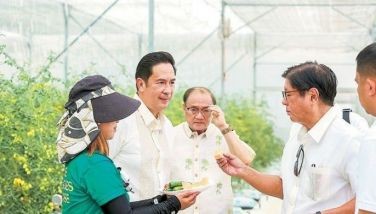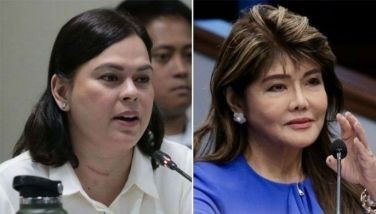Key is transparency
Last Monday’s pocket picnic gatherings (auspiciously held on the day honoring our national heroes) against the pork barrel at the Luneta and other key cities in the country were beneficial in several respects. First, it raised nationwide awareness on an issue of national importance. Second, it highlighted the power of social media to serve not only as a venue for instantaneous debate but as a tool to quickly disseminate information. Third, it exemplified the ability of the citizenry to spontaneously organize themselves without the need of being led by a popular personality or an established group. Finally, it actualized the academic proposition that sovereignty resides in the people and all government authority emanates from them. Indeed, this social media engineered call-to-arms can be deemed as the Philippine version of the ‘Occupy Wall Street movement.â€
Without a doubt, the current pork barrel set-up needs to be drastically reformed. The embedded and endemic corruption in the form of commissions or kickbacks arising from the construction of defective projects or the creation of ghost foundations is downright deplorable. Stronger and more stringent safeguards should be adopted to plug the loopholes that are prone to abuse.
I was again told by a former member of the House of Representatives that the standard operating commission (s.o.c.) received by an erring lawmaker for “hard†projects such as roads, bridges and classrooms ranges from 10 to 30%. “Semi-hard†projects such as donation of medical supplies or even the provision of scholarships can supposedly fetch an s.o.c. of 30 to 50% with the pharmaceutical firm or school providing the kickback. The alleged s.o.c. for “soft†projects such as soap and candle making or river dredging is even higher. Finally, the entire pork barrel allocation is divided among the lawmaker, the facilitators from the implementing agency and the organizers of the conduit foundation for completely fictitious projects.
* * * *
While the people’s outrage against the pork barrel system is justified, I am not certain if there is unanimity as to the aspects of the system which they are outraged about. Can we realistically remove the patronage from the politics considering that in a democratic election, the citizenry is made to vote and choose sides? Favorritism is inherent to the process. In this regard, can you, subject to basic legal and moral considerations, really fault a winning candidate from rewarding his or her supporters?
Moreover, is the power given to lawmakers to allocate money for specific projects inherently wrong? Or is this not part and parcel of a legislator’s duty to pass the national budget? It has been argued that choosing a project crosses the line and partakes of law implementation rather than law making and therefore violative of the separation of powers doctrine. But even noted constitutionalists differ on this view and recognize the legal and practical complexities that the situation brings.
* * * *
The reality remains that one of the prime duties of government is to spend public monies for the promotion of the general welfare. The issue is which branch of the national government determines what projects to spend for. Should we centralize decision making in the executive branch (which includes an unelected bureaucracy) or do we continue to decentralize the process by allowing our elected legislators to participate on the basis that they would be in a better position to know what the needs of their constituents are. Does it not also make more sense to spread the discretion insofar as making the choices are concerned?
And to those calling for its outright abolition, we need to remember that the pork barrel conundrum was not invented nor its related problems novel to the Philippines. All democracies, including United States, continue to deal with politics’ practical realities and struggle with its pernicious effects. After all, there exists good and bad cholesterol.
But regardless of which branch of government gets to choose, the key is to increase transparency and accountability in the process. More institutional checks will need to be put in place to prevent abuses of discretion. While lawmakers may have a say on the kind of projects that need to be funded, they should not have a say in respect of project implementation (e.g., the ability to choose a contractor for an infrastructure project should be an absolute no-no).
A shift from lump sum to line item budgeting is definitely a step in the right direction. As mentioned in a previous column, a live update system through a government website where citizens may log in to review budget expenditures is neither unreasonable nor farfetched. But invoking the same democratic spirit percolating during last Monday’s gatherings, the four centavos solicitation is to get the citizenry more involved in scrutinizing the budget and monitoring projects to ensure proper implementation.
While drastically reforming the current system is a non-negotiable given, it is also important to encourage a change of mindset on the part of many of our citizens. Over reliance on our elected public officials to provide handouts for KBL (kasal, binyag and libing) and other needs tends to perpetuate this culture of dependency. Of course, this is easier said than done especially for our less fortunate brethren. Unless government is able to provide adequate employment opportunities and basic social services, the end is not in sight for this “dole out†mentality and the vicious cycle it engenders.
* * * *
How time flies: Do you realize that tomorrow already marks the start of the “Ber†months? Hence do not be surprised to hear Christmas carols being played over AM radio. Let me then be the first to greet you an advance happy holidays in 2013!
* * * *
Greetings: Birth anniversary best wishes to PNP SPO3 Edgar “Gary†Lim, Timor Leste-based Jesuit, Fr. Raymund Sanchez, and San Rafael, California-based cousin, Armando “Arfie†Pantaleon.
* * * *
“You cannot help people permanently by doing for them, what they could and should do for themselves.â€
—Abraham Lincoln
Email: deanbautista@yahoo.com
- Latest
- Trending






























